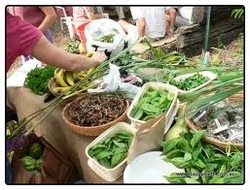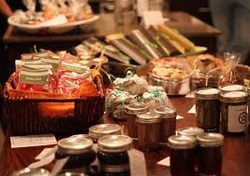 www.ponderosahomes.com
www.ponderosahomes.com Throughout history food has been swapped and traded, from cacao beans to spices. This excerpt is taken from---Food in History, Reay Tannahill:
"The raw materials of the ancient Sumerian diet...were barley, wheat and millet; chick peas, lentils and beans; onions, garlic and leeks; cucumbers, cress, mustard and fresh green lettuce. ... Everyday meals probably consisted of barley paste or barleycake, accompanied by onions or a handful of beans and washed down with barley ale, but the fish that swarmed in the rivers of Mesopotamia were a not-too-rare luxury. Over fifty different types are mentioned in texts dating before 2300 BC, and although their numbers had diminished in Babylonian times, the fried-fish vendors still did a thriving trade in the narrow, winding streets of Ur. Onions, cucumbers, freshly grilled goat, mutton and pork (not yet taboo in the Near East) were to be had from other food stalls. ..." See fascinating details of the food timeline and cooking here.
 www.happyearth.com.au
www.happyearth.com.au The Food Swap Network started in Brooklyn, New York, and so far 125 groups have been established across the US and Canada, from Honolulu to Boston. They are now spreading to Europe, with the UK leading the way. Organizers say the swaps are part of a new type of collectivism including skills sharing and clothes swapping. They also feed into current trends for thrift, recycling and making things yourself.
The aims of food swapping are to reduce waste, save people money and bring communities together. They call themselves: Pioneers of the modern food swapping movement. See Food Swap Network details here. I found a monthly meeting in St. Albans right near me.
How the food swap works:
The first 30 minutes swappers set up their stalls and fill out card with info including ingredients.
For the next hour swappers examine and sample items on offer.
If they are interesting they write their name and what they are prepared to swap.
In the final 30 minutes the swapping and trading actually happen.
In the seventies, my advertising executive husband suffered a nervous breakdown. I made the decision to accept my father-in-law's generous offer and moved the family with three children from Adelaide, South Australia, to the coastal village of Robe on the far side of the Coorong National Park. We lived in his house in the township (Population 500) and my husband gradually regained peace working to stabilize sand hills on an estate. I settled the children into new schools and set up an extensive vegetable garden.
 franishnonspeaker.com
franishnonspeaker.com Everyone wins if they swap labor and goods. I'm sure there is enough big business to keep governments running. I won't even discuss the way oil companies have been cheating by unfairly raising the prices of petrol. To my way of thinking, barter works best for normal people. You probably have your own opinion.

 RSS Feed
RSS Feed






